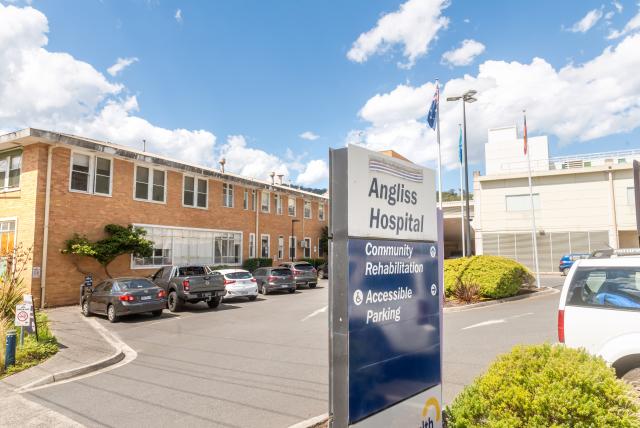
By Shamsiya Hussainpoor
Community members and hospital staff are staggering after the announcement that the Upper Ferntree Gully’s Angliss Hospital’s Intensive Care Unit (ICU) will close later this year – the decision, driven by ongoing construction works at the hospital, has sparked serious concerns about the impact on patient care, hospital operations, and the local community.
Ann-Marie Caspanello, one of the first patients to use the ICU when it opened in 2018, shared her shock and disappointment over the closure.
In November 2018, Ms Caspanello was rushed to Angliss Hospital after a severe asthma attack, where she spent two weeks in the ICU, including seven days in an induced coma.
For Ms Caspanello and her family, the ICU’s proximity to their home in Rowville was a crucial factor in her recovery.
“Being so close to home was a real blessing for my family,” she said.
She said it allowed her husband and young daughter to visit easily and offer emotional support during her recovery.
Had she been transferred to a hospital farther away, she believes the strain on her family and her own recovery would have been far greater.
Her husband, Patrick Benko, expressed his concern about the growing population in the area and the increasing need for local healthcare services.
“The area is growing with more townhouses being built, and the need for an ICU will only increase,” he said.
He questioned why such a crucial facility would be closed, especially after only six years of service.
“It’s needed more than ever, especially with the added pressures from Covid-19,” Mr Benko said.
Inside the hospital, staff are also reeling from the announcement.
A nurse, who wished to remain anonymous, said the closure was communicated to staff in early January 2025.
The reason given was that ongoing construction would create dust and vibration, making it difficult for the ICU to remain operational.
Prior to the closure announcement, staff had been told that only one set of lifts on the floor would be closed to accommodate the new building, but the situation changed unexpectedly.
The nurse described the closure as devastating, especially for the ICU team, who have worked tirelessly to provide high-quality, critical care for patients over the past six years.
Staff are also worried about the impact on other hospital departments.
“The care we currently deliver cannot be replicated by the skeletal cover proposed,” the nurse said.
With ICU staff being redeployed to Box Hill ICU, the hospital’s Emergency Department (ED) will bear the brunt of the additional pressure, further exacerbating existing staffing shortages.
The nurse expressed concerns about the lack of support for obstetrics, general ward patients, and the theatre complex, all of which rely on the ICU for critical care.
The change could result in delays for patients needing intensive care, particularly as the state’s retrieval services are already stretched thin.
One of the biggest fears is patients will face life-threatening delays due to the closure.
“Patients will have to be transported to other hospitals for ICU care, which could take precious time,” the nurse said.
The added strain on transport services, already busy covering the whole of Victoria, will make timely access to critical care more difficult.
With the closure, the Liaison team, which provides critical support for deteriorating patients throughout the hospital, will also be withdrawn.
This will place even more stress on ward nurses, who will have to manage the sickest patients without the specialist support they currently receive.
The nurse said the community deserves better, particularly given the substantial public funding that went into the ICU’s construction just six years ago.
“Would you want to risk your life, or that of a family member, knowing that the ICU might not be available when you need it?” the nurse said.
The closure has left ICU staff facing an uncertain future.
Many nurses have completed postgraduate qualifications in critical care, and now they are left wondering whether they will have jobs in the future.
Senior staff members, in particular, are unsure where they will be redeployed or whether they will continue to work in an ICU setting at all.
The lack of transparency from Eastern Health, which governs the hospital, has added to the anxiety.
Eastern Health’s spokesperson said managing a project of this nature, the safety of staff, patients and community remains of upmost importance.
“The next stage of the Eastern Health Angliss development project is underway and we are looking forward to its completion in mid 2026,” the spokesperson said.
“During construction, access to the ICU is inhibited. The practical solution to treat critically unwell patients includes treating all those suitable at the Intensive Care facilities at our Box Hill and Maroondah campuses.”
“A new model of care has been developed to ensure patient care will not be compromised.”
Locals, including Ms Caspanello and her family, are frustrated by the lack of communication about the decision and the future of healthcare services in the region.
“If it wasn’t for the ICU being so close, I don’t think I would have recovered as well as I did,” Ms Caspanello said.
Mr Benko is equally concerned, he said, “the population in this area is growing, and the need for an ICU will only increase. It just doesn’t make sense to close it now.”
Staff at the hospital are also disappointed by the lack of support or acknowledgment from the executive team.
“We all love our unit, and we believe in delivering high-standard, researched-based care,” the nurse said.
“It’s hard to understand why they would close something that’s been so vital to the community.”
As the closure date looms, both staff and community members are urging Eastern Health to reconsider the decision, stressing that closing the ICU will have serious consequences for patient care and the region’s healthcare system.
For now, the community remains uncertain about what the future holds, but there’s a growing call for action to ensure that critical care remains available when it’s needed most.






